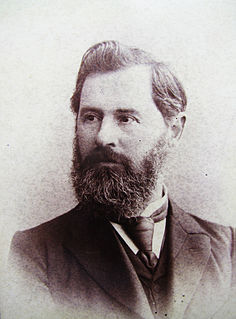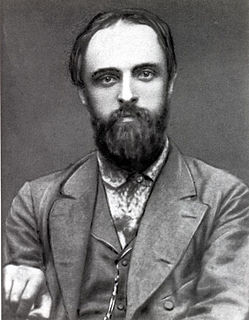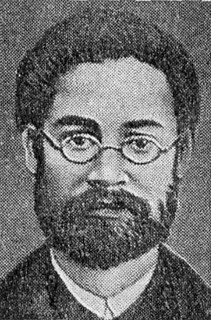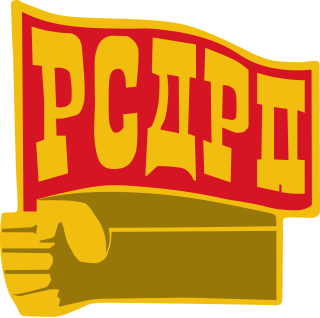Related Research Articles

Pavel Borisovich Axelrod was an early Russian Marxist revolutionary. Along with Georgi Plekhanov, Vera Zasulich, and Leo Deutsch, he was one of the members of the first organization of Russian Marxists, Emancipation of Labor. After the 2nd Congress of the Russian Social Democratic Labour Party, he was part of the Menshevik faction, with which he was identified until his death.

Lyubov Isaakovna Axelrod was a Russian revolutionary, Marxist philosopher and an art theoretician.
Zhizn was a Russian magazine published first in Saint Petersburg (1897-1901), then in London and Geneva (1902).

Alexander Nikolayevich Potresov was a Russian social democratic politician and one of the leaders of the Menshevik faction of the Russian Social Democratic Labour Party. He was one of six original editors of the newspaper Iskra, under the pen name "Starover".
The Neutral Group of Social-Democrats in Berlin was a group of exiled Russian Social Democrats in Berlin, formed round V. A. Bazarov in the autumn of 1900 and set itself the task of healing the split between the supporters of Rabocheye Delo and the Emancipation of Labour group after the Second Congress of the Union of Russian Social-Democrats Abroad. Among its members were also M. G. Vecheslov and I. B. Basovsky. According to Bazarov, the group sent its representatives to Geneva in early 1900 to persuade the Iskra and the Sotsial-Demokrat organisation to be reconciled with the Union. The group issued three or four political proclamations and was disbanded in the summer of 1901.

Arkadi Kremer was a Russian socialist leader known as the 'Father of the Bund'. This organisation was instrumental in the development of Russian Marxism, the Jewish labour movement and Jewish nationalism.

Iskra was a political newspaper of Russian socialist emigrants established as the official organ of the Russian Social Democratic Labour Party (RSDLP).

Georgi Valentinovich Plekhanov was a Russian revolutionary, philosopher and Marxist theoretician. He was a founder of the social-democratic movement in Russia and was one of the first Russians to identify himself as "Marxist". Facing political persecution, Plekhanov emigrated to Switzerland in 1880, where he continued in his political activity attempting to overthrow the Tsarist regime in Russia. Plekhanov is known as the "father of Russian Marxism".
Emancipation of Labour was the first Russian Marxist group. It was founded in exile by Georgi Plekhanov, Vasily Ignatov, Vera Zasulich, Leo Deutsch, and Pavel Axelrod, at Geneva (Switzerland) in 1883. Deutsch left the group in 1884 when he was arrested and sent to Siberia and Sergei Ingerman joined in 1888. The group published the first Russian language translations of many works by Karl Marx and distributed them. It became the major adversary to the Narodniks on the left wing of politics in the Russian Empire.
Gevorg Harutyuni Gharadjian, also known as S. T. Arkomed, was an Armenian political activist and revolutionary, one of the founders of Social Democrat Hunchakian Party.

The Second International (1889–1916) was an organisation of socialist and labour parties, formed on 14 July 1889 at two simultaneous Paris meetings in which delegations from twenty countries participated. The Second International continued the work of the dissolved First International, though excluding the powerful anarcho-syndicalist movement. While the international had initially declared its opposition to all warfare between European powers, most of the major European parties ultimately chose to support their respective states in World War I. After splitting into pro-Allied, pro-Central Powers, and antimilitarist factions, the international ceased to function. After the war, the remaining factions of the international went on to found the Labour and Socialist International, the International Working Union of Socialist Parties, and the Communist International.
Revolutionary socialism is a political philosophy, doctrine, and tradition within socialism that stresses the idea that a social revolution is necessary to bring about structural changes in society. More specifically, it is the view that revolution is a necessary precondition for transitioning from a capitalist to a socialist mode of production. Revolution is not necessarily defined as a violent insurrection; it is defined as a seizure of political power by mass movements of the working class so that the state is directly controlled or abolished by the working class as opposed to the capitalist class and its interests.

The Russian Social Democratic Labour Party, also known as the Russian Social Democratic Workers' Party or the Russian Social Democratic Party, was a socialist political party founded in 1898 in Minsk.

The St. Petersburg League of Struggle for the Emancipation of the Working Class was a Marxist group in the Russian Empire. It was founded in St. Petersburg by Vladimir Lenin, Julius Martov, Gleb Krzhizhanovsky, Anatoly Vaneyev, Alexander Malchenko, P. Zaporozhets, V. Starkov and others in the autumn of 1895. It united twenty different Marxist study circles, but Lenin dominated the league through the 'central group'. Its main activity was agitation amongst the workers of St Petersburg and the distribution of socialist leaflets to the factories there.

Rabocheye Delo was a non-periodical political newspaper and an organ of the Union of Russian Social Democrats Abroad. It ran from April 1899 to February 1902. The printing house was in Geneva and the editorial office was in Paris. Its editors were Boris Krichevsky, Pavel Teplov, Vladimir Ivanshin and, from 1900, Aleksandr S. Martynov. A total of 12 issues were published in nine volumes. The editorial board of Rabocheye Delo was the foreign center of the Economists.

Rabochaya Mysl was a Russian social-democrat newspaper and bearer of the Economist current.
Listok Rabotnika was a non-periodical newspaper of the Russian Empire, published from 1896 to 1898 in Geneva. It was an organ of the Union of Russian Social Democrats Abroad.
Rabochaya Gazeta was an illegal social democratic newspaper in the Russian Empire, published in 1897 in Kiev. It was an organ of the Russian Social Democratic Labour Party (RSDLP). The editors included Boris L. Eidelman, P. L. Tuchapsky and N. A. Vigdorchik.

Isaak Khristoforovich Lalayants was a Russian revolutionary, Marxist, Bolshevik and comrade-in-arms of Vladimir Lenin.

Vladimir Petrovich Makhnovets, also known as Akimovhe, was a leader of the Russian Social-Democrats.
References
- ↑ Lenin, Vladimir Ilyich (December 1900). "The Split in the Union of Russian Social-Democrats Abroad". Marxists Internet Archive.
- ↑ Lenin, Vladimir Ilyich (September 1900). "TO ***". Marxists Internet Archive.
- ↑ Lenin, Vladimir Ilyich (September 1900). "TO Y. M. STEKLOV". Marxists Internet Archive.
- ↑ Lenin, Vladimir Ilyich (March 1902). "What Is To Be Done? — Appendix: The Attempt to Unite Iskra With Rabocheye Dyelo". Marxists Internet Archive.